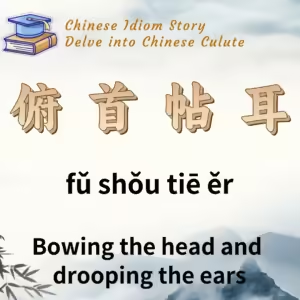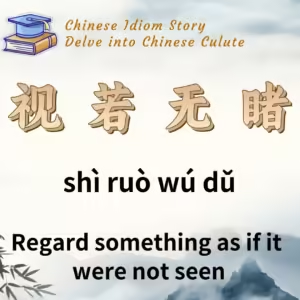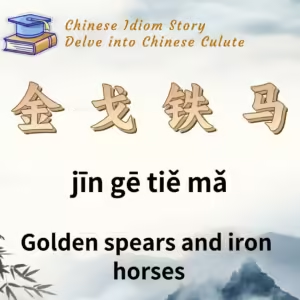
Chinese Idiom: 俯首帖耳 (Fu Shou Tie Er)
English Translation: Bowing the head and drooping the ears
pīn yīn: fǔ shǒu tiē ěr
Idiom Meaning: This idiom describes a submissive and servile demeanor, indicating a disgraceful attitude of bowing down and obeying.
Historical Source: Han Yu’s Letter to Wei She (唐代韩愈《应科目时与人书》)
Idiom Story:
The idiom “俯首帖耳” originates from a letter written by the renowned Tang Dynasty poet Han Yu during the ninth year of Emperor Dezong’s Zhenyuan era (AD 793) when he was preparing for the imperial examination known as 博学宏词科. In this letter addressed to Wei She, Han Yu aimed to convey his talents while seeking assistance and support in his academic pursuits.
In the letter, Han Yu references a mythical creature living by the shores of the Heavenly Pool and the Yangtze River. This creature, capable of stirring winds and waves if it had access to water, finds itself in a predicament when deprived of it. The creature symbolizes those who are talented but lack opportunities and recognition. It is reliant on others to provide it with water, or in metaphorical terms, the chances it needs to thrive.
However, the creature expresses a strong will, proclaiming that it would rather perish in the dry mud than bow its head and wag its tail like a dog seeking pity from its master. This expression of pride and defiance serves as a poignant critique of the necessity to humbly plead for help in a society that often overlooks talent unless it is presented in a subservient manner.
Han Yu’s vivid imagery and refusal to adopt a groveling posture led to the phrase “俯首帖耳” becoming synonymous with the idea of humbly submitting to authority or circumstances, often in a manner that is seen as shameful or disgraceful. The idiom encapsulates the tension between pride and the desperation to seek help, highlighting the struggles of talented individuals who feel forced into servility for their survival.






